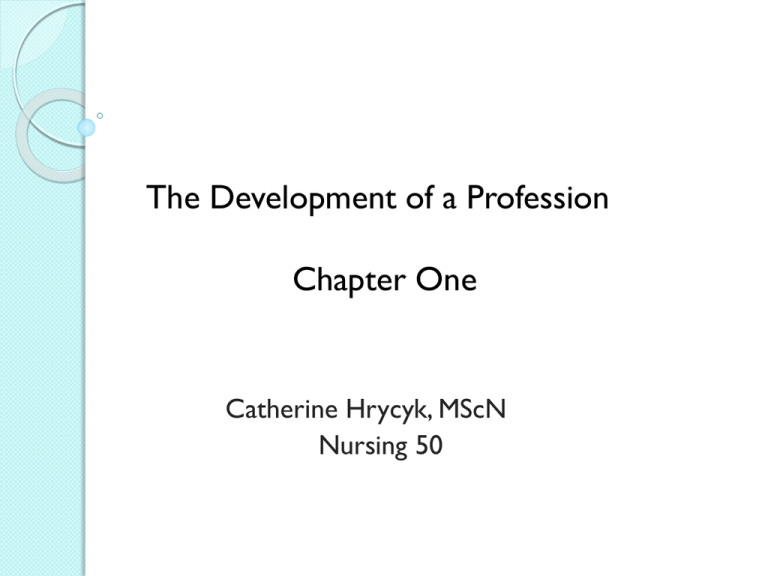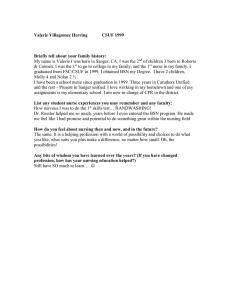The Development of a Profession Chapter One Catherine Hrycyk, MScN Nursing 50
advertisement

The Development of a Profession Chapter One Catherine Hrycyk, MScN Nursing 50 Topics for today: -Professionalism terminology -Nursing as a profession -Members of the healthcare team -Power & empowerment of nurses Professionalism Terminology ◦ Position: a group of tasks assigned to one individual ◦ Job: a group of positions that are similar in type and level of work ◦ Occupation: a group of jobs that are similar in type of work and are found throughout an industry Professionalism Terminology Profession: a type of occupation that meets certain criteria that raise it to a level above an occupation Professional: a person who belongs to and practices a profession Professionalism: the demonstration of high-level personal, ethical and skill characteristics of a member of a profession What is nursing’s public image when it comes to being viewed as a profession? Nursing as a Profession when measured against ‘Professional Traits’…. High intellectual level of functioning -nurses use assessment skills, critical thinking, make judgments, use of advanced technology High level of individual responsibility and accountability -nurses accept and must demonstrate high levels of individual responsibility for the care and services they provide Nursing as a Profession when measured against ‘Professional Traits’…. Specialized body of knowledge -compiled through the research efforts of nurses that hold advanced degrees Evidence-based practice -interventions based on data from research that demonstrates that they are appropriate and successful Public service/ altruistic activities -nurses working in remote areas, care for sick and dying, working shifts and weekends Nursing as a Profession when measured against ‘Professional Traits’…. Well Organized and Strong Representation -NLN, ANA. Organized, but not strongest Have a Code of Ethics -published 1st in 1971, but updated to reflect current healthcare and nsg. practice Competency and Professional Licensure -national licensing exam to demonstrate qualification. Legal activity regulated by state practice act and governing boards Nursing as a Profession when measured against ‘Professional Traits’…. Entry Level of Education for Practice -nursing only major discipline that does not require a baccalaureate degree in order to obtain licensure Autonomy and Independence of Practice -nursing is independent and interdependent. Some advanced practice nurses establish their own practices. Other professions need to recognize nursing as having practitioners who practice independently to be considered a ‘true profession’. Nursing as a Profession when measured against ‘Professional Traits’…. Professional Identity and Development -many nurses still view nursing as a job rather than as their life’s work (probably because it is not recognized as a true profession!) So, is nursing a profession? It’s pretty close but still lacking in a few areas Main area is education It will be hard to claim that nursing is a full profession until the entry level is a BS degree Public still does not see nursing as a profession Members of the Healthcare Team Table 1.1 (on page 11) reviews the non-nursing members. Please review. UAP- unlicensed assistive personnel (CNA) LPNs- licensed practical nurse RNs- registered nurse -LPN & RNs (ADN grads)- technical nurses BSN, MSN and DNS/PhD- professional Advanced Practice Nurses- CNSs, NPs Case Managers- high-risk, LT health problem coordinators Empowerment in Nursing What is power? ◦ The capacity to exert influence ◦ The ability to influence other people to do things that they may or may not want to do Origins of Power Referent: depends on establishing and maintaining a close personal relationship with someone. (nurses therapeutic relationship with clients) Expert: derived from knowledge, skill or expertise. (nurse’s education & experience ↑ their expert power) Coercive: the ability to punish, withhold rewards & threaten punishment Origins of Power Reward: ability of one person to grant another some type of reward for specific behaviors/ changes in behavior (praise) Legitimate: legislative or legal act that gives an individual or organization a right to make decisions that they might not otherwise have authority to make (license of nurse) Collective: professional organization is focal point for this source of power How to Increase Power in Nursing Professional unity! (ANA= 2.7 million) Political activities! (related to practice issues. We are the experts) Accountability and professionalism! (establish standards & evaluation) Networking! (support system. “Old boy”) See you next class…… Please do your readings & bring thoughtful questions!
